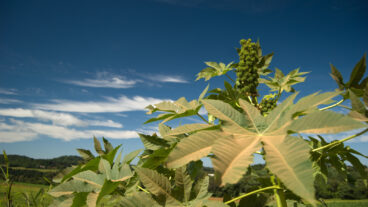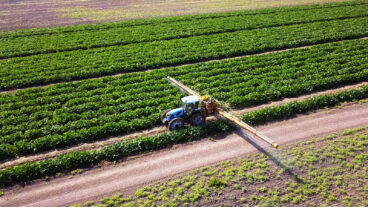Rabbis, imams, priests and beauty queens in Israel are praying for rain as the country experiences its driest November in decades, and what could be the seventh consecutive year of drought.
It started in late September with a sharp rise in the price of tomatoes. The Israeli public, having sweated and sweltered as usual through the hot, dry Israeli summer, suddenly became aware of a shortage of its favorite salad ingredient. Betwixt and between accusations of price gouging on the part of retail chains and government restrictions on imports, one fact was clear: Tomato production for the first quarter had decreased by 20 percent as compared with 2009 and Israel’s six-year-long dry spell was thrown in the face of the Israeli consumer like the proverbial rotten tomato.
In fact, this November was Israel’s driest in 48 years; since 1962. Already in June, Israel Water Authority head Prof. Uri Shani was predicting that the coming winter would be harder than the previous six. Late in November, the Water Authority updated its forecast for winter 2010-11 in line with Shani’s prediction.
The dire situation prompted an announcement by Prime Minister Benjamin Netanyahu, who said that: “The recent dry months, including the driest November in the history of the state, are a warning light to us all that the threat of climate change is no less menacing than the security threats that we face. I intend to act determinedly in this field. In a country that suffers from a severe water shortage, this is an existential struggle.”
Fasting, prayers and hot-air balloons
According to the local business daily Globes, the Water Authority announced that water flow into Lake Kinneret (the Sea of Galilee) for the month of November was the lowest since measurements began in 1927. “The Kinneret’s water level on November 25 was 214.03 meters [702 feet] below sea level, a shortfall of 5.25 meters [17 feet], amounting to 850 million billion liters of water. The Kinneret is now just 77 centimeters [30 inches] above the Black Line – the level of irreversible damage, after falling 1.39 meters [4.5 feet] over the summer. The water level is falling by half a centimeter [.2 inches] a day.”
If things continue this way, the result will be a seven-year drought. The figure with its allusion to the biblical seven lean years has sent Israel’s religious communities into an overdrive of zeal. In a rare moment of unity among Israel’s Orthodox Jewish sects, rabbis have issued a joint call to their followers to add Ve’anenu, a special prayer for rain and for God’s mercy in general, to the Amida, the central prayer of the thrice-daily service.”
Israel’s chief rabbis Yona Metzger and Shlomo Amar recently called for a half-day of fasting and prayers for rain at the Western Wall. Just before that, Rabbi Menashe Malka and Rabbi Reuven Deri, together with members of the Eshkol Regional Council in the north-western Negev and beauty contest winner Shavit Wiesel, rose into the heavens in a hot air balloon to pray for rain.
On the same day that the rabbis ascended heavenward, worshippers including Rabbis Metzger and Amar gathered at the tomb of legendary rainmaker Honi HaMe’agel in the northern town of Hatzor HaGlilit. The day before, another group boarded a tourist boat on the Kinneret for a mass prayer organized by the Emek HaYarden (Jordan Valley) Regional Council and attended by Council head Rabbi Shlomo Didi, Deputy Minister of Finance Yitzhak Cohen and Rabbi Simcha Hacohen Kook, chief rabbi of Rehovot.
Drought prompts interfaith collaboration
Earlier this month, Jewish, Christian and Muslim religious leaders conducted a joint prayer for rain in the Muslim village of Wallaja.
The general public, for its part, continues to enjoy the endless summer – whether on the beach, in the park, on the bicycle trail or at the neighborhood cafe. Jerusalemites are taking advantage of the unseasonable climate that warms even the city’s chill night air. But no matter what, the conversation turns invariably to concerns about the weather.
Because Israel’s secular community is just as concerned about the lack of rain, the Water Authority announced it would be further cutting water allocations for agriculture (a 14% cut in drinking-quality water and a 5% cut in purified wastewater). It will also continue the successful water conservation campaign launched last year, as well as its efforts to distribute faucet regulators free-of-charge to the Israeli public.
Early last month, some 500 academics and government officials from more than 50 countries participated in a four-day conference: “Drylands, Deserts, and Desertification: The Route to Restoration,” at Ben-Gurion University‘s campus in Sde Boker in the Negev where the desert’s size has actually been reduced since 1948, due in no small part to Israeli technologies such as drip irrigation, water re-use and the development of drought resistant plants.
Perhaps Israel’s salvation lies not in praying for what may or may not issue forth from the clouds, but in using its existing resources all the more wisely.
{artsexylightbox autoGenerateThumbs=”true” convertImage=”crop” path=”https://www.israel21c.org/wp-content/uploads/stories/featured_photo_essays/Rain_New” previewWidth=”100″ previewHeight=”100″}{/artsexylightbox}













